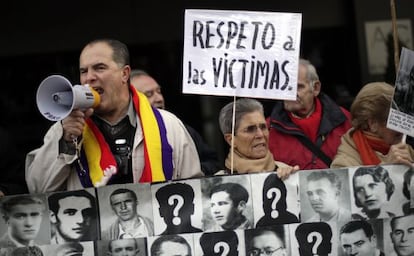ETA victims ask for “truth and justice” for those killed under Francoism
“They deserve the same rights,” says widow of politician murdered by terrorists


The victims of Franco’s repression often say they feel like “second-rate” victims compared with the victims of terrorism because the latter have access to the justice system, a special department within the Interior Ministry, and an office providing psychological support.
Instead, the relatives of people killed during the Civil War and ensuing decades of dictatorship say they have to seek assistance abroad. The United Nations has scolded Spain repeatedly for not seeing to their needs, and a judge in Argentina is investigating Francoist crimes.
Last Sunday, former High Court Judge Baltasar Garzón — who attempted to investigate these crimes himself and was suspended in 2010 for overstepping his authority — publicly asked the victims of the Basque terrorist group to recognize and support Franco’s victims. At an event to demand the creation of a truth commission, Garzón, who continues to actively work towards getting recognition for Franco’s victims, said “there are categories: there are first-rate victims and second-rate victims, and that is a very serious thing.” His words sparked controversy, with critics wondering why he would compare ETA’s victims with those of Franco in the first place.
The Association of Victims of Terrorism (AVT), the largest support group, declined to issue an opinion on the matter. But a few ETA victims have come out on an individual basis to support the notion that Franco’s victims deserve better treatment.
“They should have the same rights: truth, justice and reparation, just like us,” said Mari Carmen Hernández, widow of Jesús María Pedrosa, a Popular Party (PP) councilor from Durango, in Bizkaia province, who was assassinated by ETA in 2000. Hernández said the people who were executed by Falangists and the people who were assassinated by terrorists shared “their defense of liberties; they were killed because of their ideas.”
Francoism victims are not as politically profitable as victims of terrorism are”
Joaquín Vidal, president of the Andalusian Association of Victims of Terrorism, also believes that “all victims — victims of gender violence, of Francoism, of terrorism — must receive the same assistance and protection. The pain is the same.”
Robert Manrique, a survivor of ETA’s worst massacre, the 1987 attack on the Hipercor supermarket in Barcelona, which killed 21 people, said the victims of Francoism “have an added layer of suffering.”
“They suffer from abandonment and because they were never able to give their loved ones a proper burial,” he said. “Governments have viewed ETA victims as a tool for partisan use. As for Franco’s victims, after so many years of oblivion, they thought that nobody would come out in their defense. They are not as politically profitable as some victims of terrorism are.”
Manrique notes that for many years, ETA’s victims suffered a similar kind of abandonment and incomprehension. “Until 1999 there was no law to support the victims of terrorism. Franco’s victims have been waiting for 70 years, and they still don’t have the legislation they deserve.”
The Historical Memory Law, passed in 2007 by the previous Socialist administration, set aside some money to pay for exhumations, but the conservative government of Mariano Rajoy, who came to power in November 2011, eliminated those funds and closed down the office that had been set up to assist the victims of the dictatorship.
Maite Pagazaurtundua, sister of a former chief of the local police in Andoain (Gipuzkoa) who was killed by ETA in 2003, invited Franco’s victims to meet with her and other members of the Collective of Victims of Terrorism in the Basque Country (Covite) to “share experiences.”
Tu suscripción se está usando en otro dispositivo
¿Quieres añadir otro usuario a tu suscripción?
Si continúas leyendo en este dispositivo, no se podrá leer en el otro.
FlechaTu suscripción se está usando en otro dispositivo y solo puedes acceder a EL PAÍS desde un dispositivo a la vez.
Si quieres compartir tu cuenta, cambia tu suscripción a la modalidad Premium, así podrás añadir otro usuario. Cada uno accederá con su propia cuenta de email, lo que os permitirá personalizar vuestra experiencia en EL PAÍS.
¿Tienes una suscripción de empresa? Accede aquí para contratar más cuentas.
En el caso de no saber quién está usando tu cuenta, te recomendamos cambiar tu contraseña aquí.
Si decides continuar compartiendo tu cuenta, este mensaje se mostrará en tu dispositivo y en el de la otra persona que está usando tu cuenta de forma indefinida, afectando a tu experiencia de lectura. Puedes consultar aquí los términos y condiciones de la suscripción digital.








































